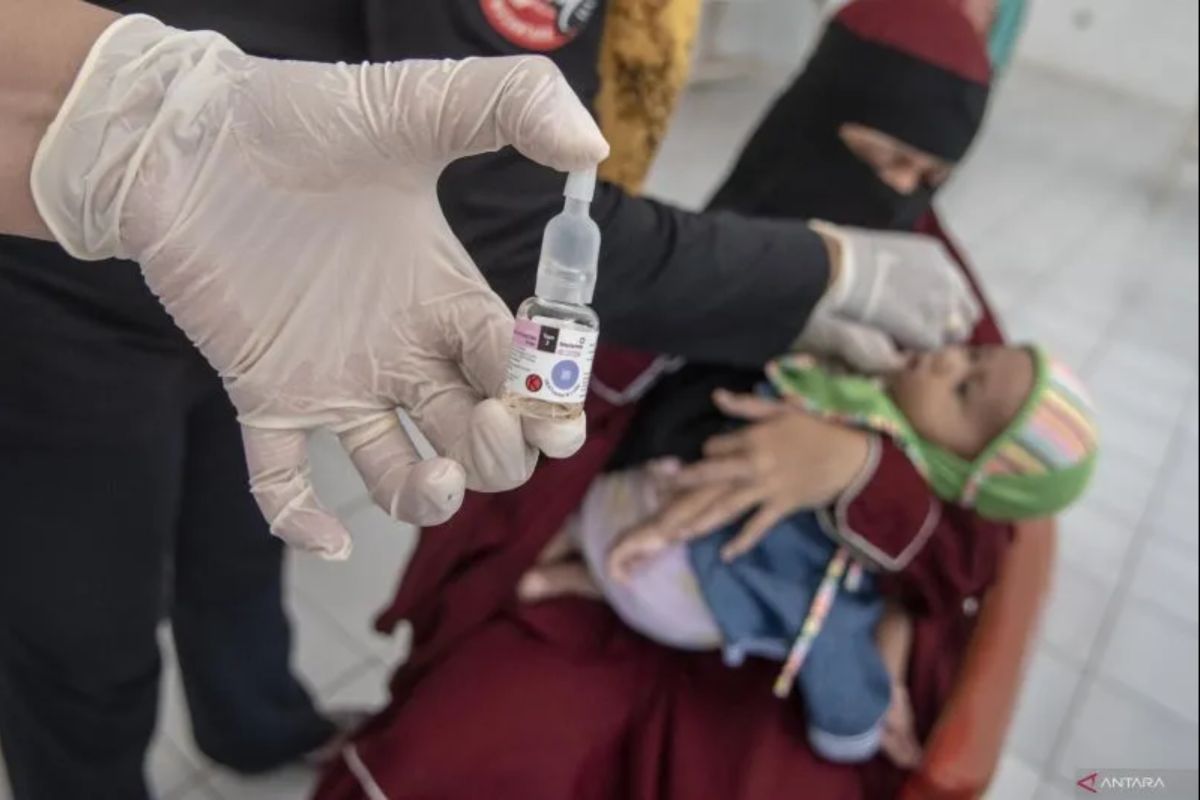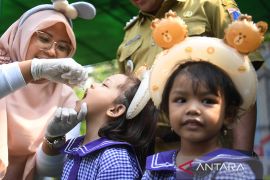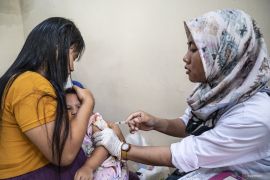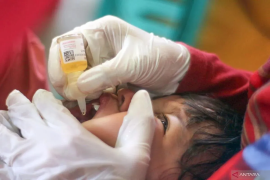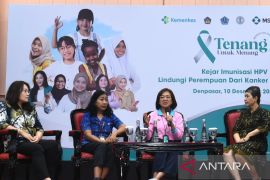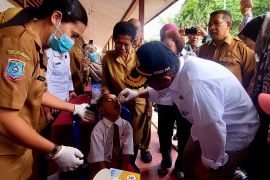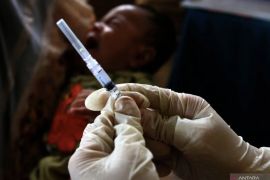With people preferring to stay at home to stay protected from COVID-19, the focus of health workers has also shifted to handling COVID-19, including vaccinating more than 234 million targeted recipients against the deadly virus.
As a result, in the 2019–2021 period, more than 1.7 million babies in Indonesia were late in receiving basic immunization. More than 600 thousand (37.5 percent) of those babies were from Java and Bali islands.
The figure does not include newborn babies who were not immunized until this year. The National Population and Family Planning Agency (BKKBN) has pegged the number of newborn babies that are not immunized at around 370 thousand to 500 thousand per year.
According to the Directorate General of Disease Prevention and Control at the Ministry of Health, delay in immunization can trigger the community immunity that has been built in Indonesia since 1956 to get declined.
Currently, the coverage of immunization among children aged 0 to 59 months in various regions is below 70 percent. In fact, before the pandemic, the coverage of basic immunization stood at 80 to 90 percent of the children's population in each region.
Immunization coverage of below 50 percent is a cause for alarm as it will leave people vulnerable to diseases that can be prevented through immunization, such as tuberculosis, polio, diphtheria, pertussis, tetanus, hepatitis, measles, and rubella.
The number of cases of diseases that can be prevented with immunization has started to rise in several regions. One of them is diphtheria, which had vanished in Indonesia by 1990 and emerged again in November 2021 in West Kalimantan and Southeast Sulawesi, with the number of cases recorded at 130 at least.
In February 2023, an outbreak status was announced for diphtheria by the Garut district government, West Java, after dozens of infections were recorded in the district. As many as 8 people underwent self-isolation, 3 were hospitalized, and at least seven people were reported to have died of the infection.
Measles and rubella also emerged in several areas, such as East Kalimantan, Central Sulawesi, South Sulawesi, West Sulawesi, North Maluku, and Papua.
Positive cases of measles spread to 34 districts and cities in 17 provinces, while rubella spread to 44 districts and cities in 17 provinces as of early 2022.
In the past two years, the Ministry of Health also received reports of polio outbreaks in Pidie district, Aceh, which recorded three patients, and in Purwakarta district, West Java, which recorded one patient.
Those reports, at the same time, eliminated Indonesia's polio-free status that had been in place since March 27, 2014.
Multiple immunizations
The Ministry of Health has initiated several programs to accelerate immunizations, including multiple immunizations that involve administering two or more vaccines in different packages at the same time.
The World Health Organization (WHO) and Global Polio Eradication have recommended the provision of oral poliovirus vaccine (OPV), bivalent oral polio vaccine (bOPV), and inactivated polio vaccine (IPV) to children to provide them stronger protection against polio.
Head of the National Commission on Adverse Effects Following Immunization (Komnas KIPI), Hindra Irawan Satari, said that several studies conducted around the world have shown that multiple immunizations are safe for children.
The reports regarding this have come from the Infectious Disease Society of America (IDSA), the HIV Medicine Association (HIVMA), Oxford University, the Institute of Medicine, and the Center for Disease Control and Prevention (CDC) of the United States, among others.
Multiple injections can be administered at different sites or the same spot by maintaining a spacing of around two centimeters or one inch.
Regarding safety, Komnas KIPI has finished research in East Lombok and West Lombok to determine the effects of the provision of one shot of the pneumococcal conjugate vaccine (PCV) versus the provision of the PCV with DPT-HB-Hib (diphtheria, pertussis, tetanus, hepatitis B, pneumonia, and meningitis) vaccine.
The research, which was carried out from May 2022 to February 2023, did not show significant differences in effects in immunized participants. In addition, IPV immunization, which has been carried out simultaneously with other antigen vaccines in Yogyakarta since 2013, has also been proven safe.
Satari said that multiple immunizations are safe because the benefits exceed the number of adverse effects following immunization (AEFI) recorded in Indonesia.
The number of AEFI linked to multiple immunizations in Indonesia in the period from 2016 to 2022 was dominated by the non-serious category at 36 thousand cases. Generally, symptoms that occur after 30 minutes of injection are mild, such as fever or fussiness in children.
Meanwhile, serious AEFI cases, such as those involving hospitalization, disability, or even death, are relatively low in Indonesia.
"AEFIs are a natural reaction of the body. Not all AEFIs are related to immunization, some are affected by the quality of the content of the vaccine. There are also cases of anxiety; they (patients) fainted, but when they were tested, their blood was normal," he said.
Innovation
The child immunization service at Cengkareng community health center (puskesmas) in West Jakarta is one of the many that can serve as an example of implementing a national immunization acceleration strategy through cross-sectoral collaboration networks and digital-based service innovation.
The puskesmas has been mandated to immunize around 36,700 (21 percent) of the total 180,970 targeted children in West Jakarta.
Cengkareng puskesmas head Sulung Mulia Putra acknowledged that cross-sectoral collaboration is needed because the number of targeted recipients is higher than the number of staff at the puskesmas, which does not even reach 400.
Therefore, networks have been established by involving midwives, early education teachers, health cadres, and officers of the Indonesian Military (TNI) and National Police (Polri), who are providing support in educating people regarding the implementation of immunization.
Officers are also regularly sweeping residential areas and apartments simultaneously.
An innovation program that has become an example in Jakarta is the Cengkareng Puskesmas Gateway Information System (Sigareng).
The text message-based service allows immunization participants to know the vaccinators' service time at the puskesmas so that they do not have to wait in long queues. Participants can register one day before a scheduled immunization via text message or WhatsApp.
Previous outbreaks and the COVID-19 pandemic, which is currently under control in Indonesia, are expected to improve people's awareness regarding immunization in overcoming epidemics, and even, deadly infections.
Related news: Complete vaccination before going home for Eid, citizens told
Related news: West Java to provide simultaneous polio vaccinations from Apr 3
Editor: Rahmad Nasution
Copyright © ANTARA 2023
